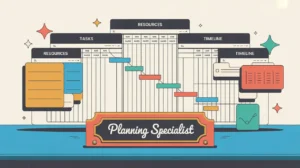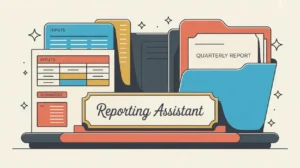What Does the Data Clerk Role Involve?
A data clerk is responsible for accurately entering, updating, and maintaining data within an organization’s information systems. This involves collecting information from multiple sources, validating records, managing spreadsheets or databases, and supporting the smooth flow of data between teams. The role typically sits within data, monitoring and evaluation, research, or operations functions depending on the organization’s structure. In both nonprofits and social enterprises, data clerks provide essential support for maintaining the integrity and reliability of organizational data, which underpins reporting, analysis, and decision making.
At What Level does this Role Operate?
Entry Level: This role typically reports to a data associate, data analyst, or monitoring and evaluation lead. It focuses on accurate data entry and routine data management tasks, offering a strong introduction to data handling practices and organizational systems.
Relative Employability: Data clerk roles are consistently available across nonprofits, social enterprises, philanthropic institutions, educational organizations, and public agencies. As organizations rely on accurate data to function effectively, data clerks provide critical support and often serve as entry points into data and analytics careers.
Relative Pay Scale: Within nonprofits and social enterprises, data clerk roles sit at the lower end of the pay scale, reflecting their administrative and operational responsibilities.
What are the Key Responsibilities and Activities?
- Enter data accurately and efficiently into organizational databases, spreadsheets, or information systems
- Validate and cross-check information to maintain data integrity
- Support routine data cleaning, updates, and archival processes
- Manage physical or digital records to ensure easy retrieval and compliance with data standards
- Coordinate with internal teams to collect required data on time and in the correct format
- Assist in generating basic reports or data summaries as requested
- Follow established data entry protocols and security procedures
- Identify and flag data inconsistencies or issues for resolution by more senior data staff
What Core Competencies and Qualifications are Needed?
Required Qualifications and Experience
The following reflect common qualifications and experience expected for this role, while recognizing that pathways may vary by context, organization, and region.
- Relevant academic background in administration, data management, social sciences, or a related field, or equivalent experience through internships or administrative work
- Familiarity with spreadsheets, databases, or basic data entry systems
- Strong attention to detail and accuracy in handling information
- Good organizational and time management skills
- Willingness to learn data systems and adhere to standards
Key Competencies
- Data entry accuracy and attention to detail
- Organizational and record-keeping skills
- Basic understanding of data workflows and systems
- Ability to follow procedures consistently
- Communication and coordination with teams
- Dependability and integrity in handling information
How are AI and Automation Shaping this Role?
An AI-native data clerk will look to AI and automation to improve data entry speed, reduce errors, and support data validation. They can use AI tools to auto-populate fields, detect inconsistencies, and standardize data formats. Automation can support repetitive data transfer tasks, scheduled updates, and routine reporting, allowing the clerk to focus on maintaining data quality and learning foundational data management skills. By integrating AI thoughtfully, data clerks can become more efficient and accurate in their work while building capabilities that support career growth.
What Career Pathways and Transferable Skills are Associated with this Role?
Data clerk roles offer a clear pathway into data associate, data analyst, monitoring and evaluation, or administrative operations positions. The skills developed in accurate data entry, organization, and validation are transferable across nonprofits, social enterprises, corporations, educational institutions, and public agencies. Many professionals in data and research begin in clerk roles, where they develop the precision and procedural discipline required for more advanced data responsibilities.







